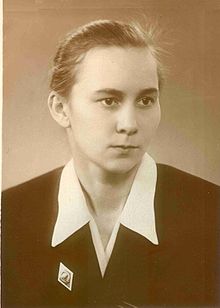Irina Konstantinovna Fyodorova
Irina Konstantinovna Fyodorowa , born Irina Konstantinovna Moshaiskaja , ( Russian Ирина Константиновна Фёдорова ; born November 28, 1931 in Leningrad ; † December 7, 2010 in St. Petersburg ) was a Soviet - Russian historian and ethnographer .
Life
Fyodorova's father Konstantin Andrejewitsch Moshaiski (1902-1959) worked in a printing company. Her mother Lidija Romanovna Steinberg (1902–1970) taught German in Leningrad schools. In 1939 Fyodorova started school at the school where her mother taught. On July 4, 1941, after the start of the German-Soviet War , her mother led the evacuation of a group of children, including her daughter and two nephews, from Leningrad to Kirov Oblast . In the railway journey by Ljuban and Malaya Vishera , the train of which was German air force bombarded. The children were in Rajon Oritschi housed in children's homes. Fyodorova returned to Leningrad in 1945 and lived in a children's home for another year.
Fyodorova studied at the Leningrad University in the Philological Faculty . She graduated with distinction in 1956 as a Romance studies and French teacher.
From August 1958, Fyodorova worked in the Leningrad Department of the Miklucho Maklai Institute of Ethnology of the Academy of Sciences of the USSR (AN-SSSR, since 1991 Russian Academy of Sciences (RAN)). Under the direction of Yuri Walentinowitsch Knorosow , she studied the Rapanui language , the Rongorongo script and the folklore of the Rapanui . In 1964 she took part in the VII International Anthropology - Ethnography Congress in Moscow . In 1966 she successfully defended her candidate dissertation on the folklore monuments of Easter Island as a historical source.
In 1978 Fyodorova published a monograph with the myths , sagas and legends of Easter Island, which is still the world's only scientific collection of Rapanui folklore monuments. For this work she received the AN-SSSR's Miklucho Maklai Prize in 1981. The Hungarian edition was published in Budapest in 1987 . The monograph contains Fjodorowa's translations of legends that Thor Heyerdahl brought back from Easter Island in his handwritten notebooks in 1956 and that could not be translated by scientists, so Heyerdahl had asked the Kunstkammer for help. Heyerdahl published Fyodorova's translations of his notes in the second volume of his expedition report in 1965.
Fyodorova continued her Rapanui research and in 1988 published her second monograph on the myths and legends of Easter Island with the world's first Rapanui dictionary and the translation of the manuscript E, which Thomas Sylvester Barthel had published in 1974 without translation. In 1994 she defended her PhD thesis published in 1993 on the culture of Easter Island in the 19th and 20th centuries. With her research she showed that the language of the Rongorongo texts differs significantly from the modern Rapanui language. In 1995 she presented the results of her own deciphering of the Rongorongo hieroglyphs in her monograph on the Rongorongo tablets of the Kunstkammer, for which she received the prize of the RAN Presidium. However, their deciphered texts made no real sense, so that other scholars rejected their translation.
In addition to the culture of Easter Island, Fyodorovna also devoted himself to the cultures of the people on other Polynesian islands ( Hawaii's natives , Māori , residents of the Marquesas , Mangarevas , Tahitis , Samoas , Tongas ). Its more than 100 publications appeared not only in the Soviet Union or Russia , but also in the United States , the United Kingdom , in France , Germany and East Germany and Chile .
Since 1995 Fyodorova was a member of the informal working group Put Predkov (Path of Ancestors) , which examined and published materials on the first Russian circumnavigations of the world . She evaluated the diaries and other records of Johann Kaspar Horners , Fyodor Ivanovich Schemelin , Makar Ivanovich Ratmanov and other participants in Adam Johann von Krusenstern's circumnavigation .
Fyodorovna was married (1961-1964 at the man's request) to the microbiologist Mikhail Lwowitsch Fyodorow (1933-2002). Her daughter Olga became a librarian and worked on her mother's books, for example the 2004 book about the missionaries of Easter Island with rare archive material .
Web links
- Literature by and about Irina Konstantinovna Fyodorova in the bibliographic database WorldCat
- Catalog of the Russian National Library : Фёдорова, Ирина Константиновна
Individual evidence
- ↑ a b c Messo America: Умерла Ирина Константиновна Фёдорова (accessed March 7, 2020).
- ↑ Фёдорова И. К .: Мифы, предания и легенды острова Пасхи . Nauka , Moscow 1978.
- ↑ RAN: Премия имени Н.Н.Миклухо-Маклая (accessed March 7, 2020).
- ↑ Фёдорова И. К .: Husvet-szigeti mitoszok, mondak es legendak. Forditotta Terbe Terez . Gondolat, Budapest 1987.
- ↑ Фёдорова И. К .: Мифы и легенды острова Пасхи . Nauka, Leningrad 1988.
- ↑ Фёдорова И. К .: Остров Пасхи. Очерки культуры XVIII — XIX вв . Nauka, St. Petersburg 1993.
- ↑ Фёдорова И. К .: Дощечки кохау ронгоронго из Кунсткамеры . МАЭ РАН, St. Petersburg 1995.
- ↑ Отдел этнографии Австралии, Океании и Индонезии (accessed March 7, 2020).
- ↑ Konstantin Pozdniakov: Les bases du déchiffrement de l'écriture de l'île de Pâques . In: Société des Océanistes . 1996, p. 289–303 ( [1] [PDF; accessed March 7, 2020]).
- ↑ Фёдорова И. К .: Миссионеры острова Пасхи (Сер. Art camera petropolitana, XII) . МАЭ РАН, St. Petersburg 2004.
| personal data | |
|---|---|
| SURNAME | Fyodorova, Irina Konstantinovna |
| ALTERNATIVE NAMES | Фёдорова, Ирина Константиновна (Russian) |
| BRIEF DESCRIPTION | Soviet-Russian historian and ethnographer |
| DATE OF BIRTH | November 28, 1931 |
| PLACE OF BIRTH | Leningrad |
| DATE OF DEATH | December 7, 2010 |
| Place of death | St. Petersburg |
